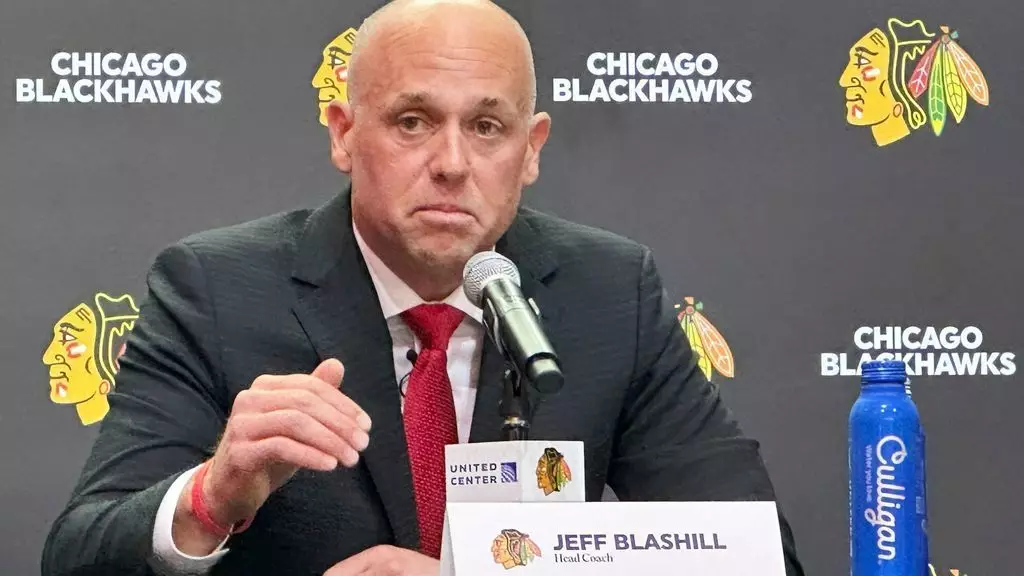The Chicago Blackhawks’ first steps into the new season have been anything but subtle. Under Jeff Blashill’s leadership, the team embarked on an intense, no-nonsense training camp aimed at laying a foundation for a culture rooted in discipline and high standards. This approach reflects a deliberate departure from past complacency, indicating that the franchise is fully committed to transformation, not just superficial change. Blashill’s insistence on speed and fundamentals underscores a belief that culture and attitude are paramount to long-term success.
His exhaustive presence on the ice, barking directives, and relentless pace give players a taste of the environment necessary to forge a resilient team. The collective fatigue—evident in Blashill’s own admission that his feet hurt—serves as a metaphor for the process: tough, demanding, but ultimately essential. It’s clear that Blashill understands the importance of establishing a mindset where accountability and relentless effort become non-negotiable, setting a tone that will ripple through the upcoming games.
Building a Future on Youth and Potential
The core of the Blackhawks’ current roster is young, gifted, and still raw—a blank slate brimming with promise. Connor Bedard, the franchise’s brightest star, symbolizes both hope and the challenge of nurturing raw talent into a cohesive winning machine. At just 20 years old, Bedard carries the weight of expectations, but also the opportunity to flourish under Blashill’s mentorship.
Rebuilding a team with such a youthful roster requires patience and strategic development. The Blackhawks are acutely aware that immediate results are secondary to cultivating a culture of consistent effort and smart play. The emphasis on system integration during camp reflects a long-term vision—players learning their roles within a cohesive framework rather than relying solely on natural talent.
As Blashill points out, establishing routines and understanding roles are step one in transforming a scattering of promising individuals into a unified team. This approach suggests that Chicago recognizes the importance of foundational systems that will support future success, rather than quick fixes or superficial hype.
Former Successes and Fresh Perspectives
Blashill’s coaching journey—marked by a tenure with the Detroit Red Wings and recent experience as an assistant with Tampa Bay—gives him a unique perspective on rebuilding. He’s been through organizational transitions before and understands that patience coupled with discipline can elevate a team from mediocrity to relevance.
His emphasis on doing things ‘right’ echoes coaching philosophies that prioritize process over immediate results. In a league obsessed with star power and wins, Blashill’s focus on fundamentals may seem old-fashioned to some, but it aligns with a deeper truth: sustained success hinges on consistency, culture, and continuous improvement. His background, especially his stint in the minors, makes him well-equipped to develop young players who need not just talent but also guidance and structure.
This strategic patience signals a conscious effort to build a resilient foundation rather than chase short-term glory. The Blackhawks’ brass seems to understand that their recent struggles aren’t unique, but their commitment to the process could yield a more sustainable future.
Addressing the Glaring Gaps and Moving Forward
A notable challenge for the Blackhawks is their goaltending situation. The absence of veteran Laurent Brossoit, sidelined after hip surgery, leaves a gap in experience and stability. Although Spencer Knight has been added and signed to an extension, the team’s goaltending depth remains uncertain. The importance of solid goaltending cannot be overstated in a rebuilding process—they are foundational to implementing a new system and confidence on the ice.
This gap reflects broader issues that many rebuilding franchises face: managing injuries, gaining consistency, and developing young players into reliable contributors. The Blackhawks are navigating this delicate phase with a clear recognition that strengthening their backbone—especially in between the pipes—is crucial in turning the tide.
Blashill’s message is clear: patience, discipline, and a shift in culture are key. Success isn’t measured solely by wins or standout individual performances, but by the incremental progress of integrating systems, fostering resilience, and building leadership from within. The journey ahead is arduous, but it’s also filled with potential. If Chicago can stick to this disciplined, process-driven approach, they might emerge stronger, more cohesive, and primed for future contention.
In a league that often celebrates instant gratification, the Blackhawks’ methodical rebuild signals a mature understanding that true greatness is cultivated through perseverance and unwavering commitment to fundamentals. This isn’t just about winning games; it’s about re-establishing identity and laying a sturdy foundation for seasons to come. With Blashill’s arrival and a clear focus on culture, Chicago appears ready to embrace the challenge—hope’s flame flickering bright in their ongoing transformation.

